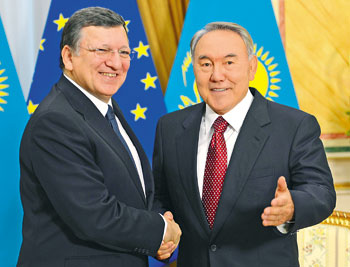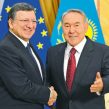
Kazakhstan Looking to the West to Ease Dependence on Russia
Publication: Eurasia Daily Monitor Volume: 11 Issue: 22
By:

On January 22, Kazakhstani President Nursultan Nazarbayev arrived in Davos to attend the 44th session of the World Economic Forum and held a number of bilateral meetings. These included, among others, private conversations with high-level officials of the European Union, the European Bank for Reconstruction and Development (EBRD) and the World Trade Organization (WTO) (Tengrinews.kz, January 22).
During his meeting with the president of the European Commission, Jose Manuel Barroso, Nazarbayev stressed the need to speed up the signing of an enhanced partnership and cooperation agreement (PCA) between Kazakhstan and the EU. Currently, their bilateral relationship is governed by a standard PCA concluded in 1995 and in force since 1999. Similar agreements already exist between the EU and countries as diverse as Kyrgyzstan, Uzbekistan, Russia, Ukraine, Georgia and Moldova (Newskaz.ru, January 24).
At the latest Eastern Partnership summit in Vilnius last November, Brussels initialed Association Agreements with Tbilisi and Chisinau, but Europe’s Central Asia diplomacy is based on four ratified PCAs (excluding Turkmenistan) and a comprehensive regional strategy adopted in 2007. As Brussels is preparing to unveil a new version of its region-wide policies to extend as far as 2020, Astana has been actively pushing for a more ambitious PCA with Europe in order to account for their constantly expanding ties. The EU is presently Kazakhstan’s leading trade partner responsible for over $50 billion worth of annual trade turnover (the official website of the EU Delegation to Kazakhstan, January 26; the European Parliament’s resolution on Kazakhstan, March 15, 2012).
Whereas the first round of talks between Kazakhstanis and Europeans took place in June 2011, further negotiations over the draft of an enhanced PCA have stalled ever since, in particular after the December 11 bloody events in Zhanaozen. In March 2012, the European Parliament heavily criticized Kazakhstani authorities for their handling of the violent riots in the oil-rich Mangistau province and demanded an “impartial investigation.” Despite these difficulties, Kazakhstan continues to be the EU’s major local interlocutor on such issues as regional security, transcontinental trade, energy, education and culture. The country’s vast hydrocarbon resources are especially important in light of Europe’s desire to diversify oil and gas imports and curb its energy dependence on neighboring Russia (Europolitics.info, June 28, 2011).
On January 24, President Nazarbayev also met with the head of the WTO, Roberto Azevedo, to discuss the progress of Kazakhstan’s accession to this organization. Kazakhstan filed its official application for membership back in January 1996 but still remains excluded from the WTO, despite the relative size of its economy and its high relevance for foreign investors. While neither Uzbekistan nor Turkmenistan have made any substantial progress in complying with WTO membership requirements, both Kyrgyzstan and Tajikistan already enjoy the status of full-fledged members, respectively since December 1998 and March 2013. As to Russia, it became the WTO’s 156th member in August 2012 (Newskaz.ru, January 24; the official website of the WTO, January 24).
According to Azevedo, one of the main stumbling blocks in Kazakhstan’s accession to the WTO is the harmonization of its obligations vis-à-vis the trilateral Customs Union (with Russia and Belarus) with WTO trade practices. Earlier in October 2013, during his visit to Minsk, Nazarbayev already deplored the resistance of some Western countries to Kazakhstan’s WTO membership because of its support for Russia’s protectionist measures. He suggested on that occasion that a special Russian-Kazakhstani commission be established to lobby Kazakhstan’s trade interests in Europe and the United States. On January 13, Kazakhstani Deputy Economy Minister Timur Zhaksylykov said that talks with the WTO over the remaining issues would be finalized by early 2015. The success of this process is, however, closely tied with the forthcoming signing by Astana of the Eurasian Economic Union’s founding treaty (Dknews.kz, January 24; Rosbalt.ru, January 13; Regnum.ru, October 24, 2013).
This May, Russia, Kazakhstan and Belarus are planning to upgrade their current economic cooperation to the level of an economic union, with the eventual introduction of a common currency and macroeconomic coordination mechanisms. Yet, many trade and investment issues have to be resolved before this trilateral integration can bear fruit. In this respect, Kazakhstani authorities have repeatedly denounced Russia’s restrictive policies preventing the entry of foreign goods into its domestic market. Neighboring Kazakhstan is also seriously concerned about Moscow’s reluctance to reconsider its oil trade regulations as well as its continuous desire to fully control the export of Kazakhstani oil to Europe (Pravda.ru, November 7, 2013).
As the promised benefits of Kazakhstan’s participation in the Customs Union look more as outright losses and Russia’s efforts to impose political integration intensify, Astana is increasingly turning westward. WTO membership and closer ties with the EU are thus construed by the Kazakhstani leadership as a means to limit Russia’s geostrategic influence without compromising the ongoing integration projects with Moscow. On January 29, President Nazarbayev approved the new foreign policy concept of Kazakhstan for the period 2014–2020, in which Eurasian integration is mentioned as a core priority. This dimension is, however, balanced by the country’s willingness to deepen ties with the West, China and the Muslim world. Astana also aims to strengthen its outreach to faraway territories in Africa and Latin America (Zakon.kz, January 29).




